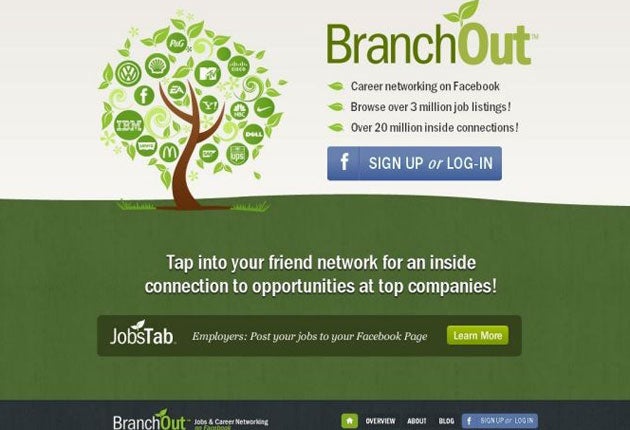Rhodri Marsden: Maybe we do need yet another social network?
Cyberclinic

I made my daily visit to Facebook yesterday, to establish if the poor souls in my social circle were feeling any better about themselves than I. As usual, some were, some weren't. As I experienced that heady emotional mix of jealousy and smugness, I noticed a message in the news feed. "Paul wants your help to grow his professional network on BranchOut," it read. My immediate reaction was to sigh, wearily; does the world need another social network, particularly one based upon recruitment and job-seeking? I receive regular automated emails asking me to help expand professional networks on LinkedIn – and then, a few days later, an automated reminder that I haven't dealt with the request. And I rarely respond. I know full well that juggling hard-boiled eggs would do more for your career than adding me to your professional network. So the idea of being lured into another world of links, recommendations, endorsements and opportunities left me feeling ambivalent.
It must be tough to launch new social networks. The promotional blurbs might say they offer a "brand new way of keeping in touch with your friends", but many of us have reached saturation point. Only by surrounding ourselves with monitors displaying live feeds of friends' faces could we establish a more profound connection; bond with them any more tightly and they may as well move in. True, the early days of social networks were characterised by migration between competitors – Friends Reunited, Friendster, MySpace, Bebo, Facebook – as colonising early-adopters dragged friends behind them in the search for the best online hangout.
But Facebook has that sewn up. It's not out of the realms of possibility that a Facebook-killer might emerge in the future, but 700 million users are demonstrating right now that this isn't happening any time soon. BranchOut, crucially, bolts onto Facebook, creating a curious mesh of professional and personal. We're clearly viewed by these recruitment-based startups like BranchOut (and Jibe, Pursuit and emp.ly) as feverishly ambitious and hungry for opportunity. Technology big-hitters are convinced that BranchOut, in particular, has potential; minds behind Napster, Wordpress, YouTube and Twitter are on board, millions of dollars of funding has been raised and in a few short months the membership has ballooned to two million. Companies using BranchOut can have their Facebook pages adorned with a "Jobs Tab", where all the current openings are listed, but BranchOut's killer feature is that anyone can post a job vacancy (unlike LinkedIn, where you need to have admin access to your company's page). A vacancy is visible to all the poster's friends and their friends; never before has the phrase "it's who you know" been more appropriate; never before have previously-close friends been pitted against each other in a public battle for the same job.
BranchOut's CEO believes there's room alongside the more austere LinkedIn for this social angle on recruitment, with graphics and badges that almost give it a gaming flavour. What privacy activists may choke on is the line starting to be blurred between the personal and the professional, thanks to the tie-in with Facebook (particularly bearing in mind news stories that demonstrate the dim view employers can take of their employee's online indiscretions.)
I can't help feeling that demarcation is wiser: a professional site, where you pretend: "I'm a highly effective and versatile manager with a proven track record of driving strategic change." And a personal one, where you're honest: "I just farted and the dog ran out of the room."
***
Mindblowing Innovation Of 2011 may well go to a product by the name of Lytro. A chap called Ren Ng came up with the concept for his PhD thesis five years ago, namely a camera which lets you take pictures now and focus the images later on, at your leisure. Technological advances have finally allowed his idea (and its facilitator, a "microlens array") to be crammed into an affordable camera – and while it sounds gimmicky, photographers who've been allowed to play with a prototype say it's a game-changer.
Photographs become interactive; switch the focus from your brother's gurning face to the majesty of Niagara Falls behind him, for example. Result.
Join our commenting forum
Join thought-provoking conversations, follow other Independent readers and see their replies
Comments
Bookmark popover
Removed from bookmarks